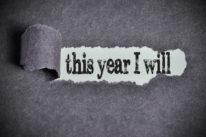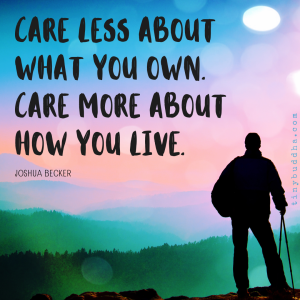
“A journey of a thousand miles begins with a single step.” ~Lao Tzu
Many of us have big, grand goals for our lives.
These goals can be tied to our work, or maybe starting a family, or ideals for a new home with that family, or travel to an exotic location we’ve long dreamed about, or pretty much anything else. Oftentimes these goals can seem a very long way from where we are presently in our lives. In fact, sometimes they can seem so far away that they appear to be totally out of reach.
As a consequence, too many of us give up even trying to make these things happen. And that’s a real shame, because sometimes all that is required to make them so is putting one foot in front of the other, in their general direction.
The Pressure of Big Steps and Overnight Success
Part of the reason we give up is that we put ourselves under pressure to make things happen quickly. We try to make grand, sweeping changes in our lives and expect overnight change. If this doesn’t happen we can quickly become discouraged and quit. We lose sight of any and all progress we may be making toward our goals.
Perhaps we try to uproot and change all our habits at once and it doesn’t happen. These habits may have been part of us for a very long time yet we expect to change them swiftly.
This cycle can repeat again and again. It can be really disheartening. We try so hard but get nowhere fast.
What I’ve found, in making significant positive changes stick in my own life, is that often the small steps and habits that underpin them do not get enough attention. In fact, I believe there is an untapped magic in these seemingly small habits. They can support even the largest of goals.
From a Writer Who Didn’t Write to One Who Writes Lots
While writing doesn’t pay all my bills, I am most definitely a writer. I think a part of me always has been on some level. It’s something I am incredibly passionate about. It’s something I spend much time and energy on.
I meet lots of writers and want-to-be writers in my travels who talk of writing their first book or starting their own blogs. Truth be told, I think most of us think there’s a book in us that we will write someday.
When I dig a little deeper, it never ceases to amaze me how many of these same people haven’t yet developed a regular writing habit. It’s like wanting to run a marathon with their only preparation being walking 800 yards to the shops on a daily basis. The odds of it happening are slim, very slim.
That’s a shame, as writing a first book, or starting a blog, is a pretty amazing milestone for anyone who has a passion for the written word and sharing their ideas.
I shouldn’t be surprised this is the case, though. You see, I was one of these people for too many years. I promised to write more than I actually wrote. I thought about the books I was going to write without writing a word. I thought about ideas for articles without committing a single word to the page.
Thankfully, this has changed in the last several years. In fact, it’s changed to the tune of seven books and counting and hundreds of articles written for my own blog and other blogs. I’ve even been lucky enough to share several articles here with the wonderful Tiny Buddha community (thank you Lori!). My words have now been read across the planet in many countries. My books have been purchased from most corners of the world.
I share this not to brag but to let you know that I have skin in this writing game, and any ideas that follow have been hard won and tested. Most importantly, none of this would have been possible if I had continued to stay in the self-imposed blocks I had put myself in.
Breaking the Big Goal Down into Smaller Steps (Write One Line)
When I was starting my writing journey, almost everything I read in terms of advice for the writer included some form of “write so many (500, 1000 etc) words a day.” Well, this never really worked well for me. I tried it and I failed regularly.
With full-time commitments elsewhere (an unrelated job, friends, hobbies, a relationship) the pressure of trying to hit a certain word count just did not fit for me. So, after many failed attempts to force it, I finally gave myself permission to try another route. I broke this down into an even tinier habit. I decided to commit to writing just one line a day.
Some days that one line turned into many pages of ideas, sometimes it was just one line. That’s okay; the habit and practice proved to be the important part of this process. It was something that worked for me and I could stick with. It was something that pulled me out from my writing inertia and got me moving in a positive direction.
Why This Works
If we make the entry point low enough, we avoid the excuses not to do something. However, if we also make the entry point meaningful, we ingrain a habit that supports regular practical steps to get to done.
Five hundred words a day may be a more meaningful target for other writers, and it’s a target that is often shared by writers of note. Some writers commit to “two crappy pages a day.” Personally, I like to make the point of entry even lower at one line.
What I’ve found is that, more often than not, one line turns into many, and just getting started creates momentum. It also allows me to be liberal with how I use my time. I don’t feel pressure to have one big writing block per day; I can find time for multiple opportunities to write instead (a little and often approach sprinkled through the day). For those of us that also have external responsibilities and unrelated jobs, this approach can be especially useful.
One line is also a low enough entry point that I don’t feel bad if I miss a day completely. And sometimes I do have days where I won’t write a word. Not the trendy advice of the day perhaps, but it works just fine for me. I feel no guilt about missing a day but often find I’m twice as productive the day after a day missed and will get lots of ideas down.
A seemingly small habit has been the catalyst for much positive change in terms of my writing.
How We Can Apply this to Other Goals
My example includes my writing because this is something I’m passionate about. Writing may not be your thing but the good news is, it doesn’t have to be. This approach travels and works for all sorts of goals. I know because I utilise it regularly for lots of personal goals.
What I’ve also found is that what appears to be a small habit change, and new behavior, can start to have a compound effect. We create positive momentum. We set ourselves up for success.
Tiny steps in the direction of a goal are still steps in that direction. There is a real magic to be found in linking steps together consistently. Big goals are fine as a guiding star, but they need to be supported with smaller steps. Developing these tiny, positive habits can support even the largest of goals. Wishful thinking will not.
Want to write a book? Get started by developing a regular writing habit. Maybe try my example of one line a day to get that done or try something else that will work for you.
Want to run a marathon? Commit to packing your kit for the morning as one micro habit. Then link this with other micro habits that support your goal, like committing to increasing your mileage gradually week by week. Don’t expect to run that marathon tomorrow unless you’ve already put lots of work in to get there.
Whatever your goal is, develop a regular practice to help get you closer to it. Set up simple habits that support this happening, and that keep you accountable, while still being achievable. Commit to this and amazing things can happen.
Micro Habits—Simple, Not Easy
This micro habit approach is incredibly simple and that’s exactly where the power of it is. There are no tricks, hacks, or ninja secrets to concern ourselves with. No sales copy or complex points of entry to worry about. We can set our own rules or have no rules. It’s so simple it can, and will, work for us if we commit to it.
Simple doesn’t mean easy, this approach still takes work. And that’s a good thing, as our goals will be all the sweeter if we’ve applied ourselves along the way.
The larger the goal, the longer this process may take and the more habits we may need to stack together. We can, however, commit to embracing the process and journey for its own end, rather than being focused purely on the destination (the where we want to get to).
Give the micro habits approach a try in earnest. You may be surprised by where it takes you.
About Carl Phillips
Carl writes short books full of big ideas. He is also the proud owner of Frictionless Living which is focused on helping readers find and live their own version of a simpler, good, life.













 Though I run this site, it is not mine. It's ours. It's not about me. It's about us. Your stories and your wisdom are just as meaningful as mine.
Though I run this site, it is not mine. It's ours. It's not about me. It's about us. Your stories and your wisdom are just as meaningful as mine.